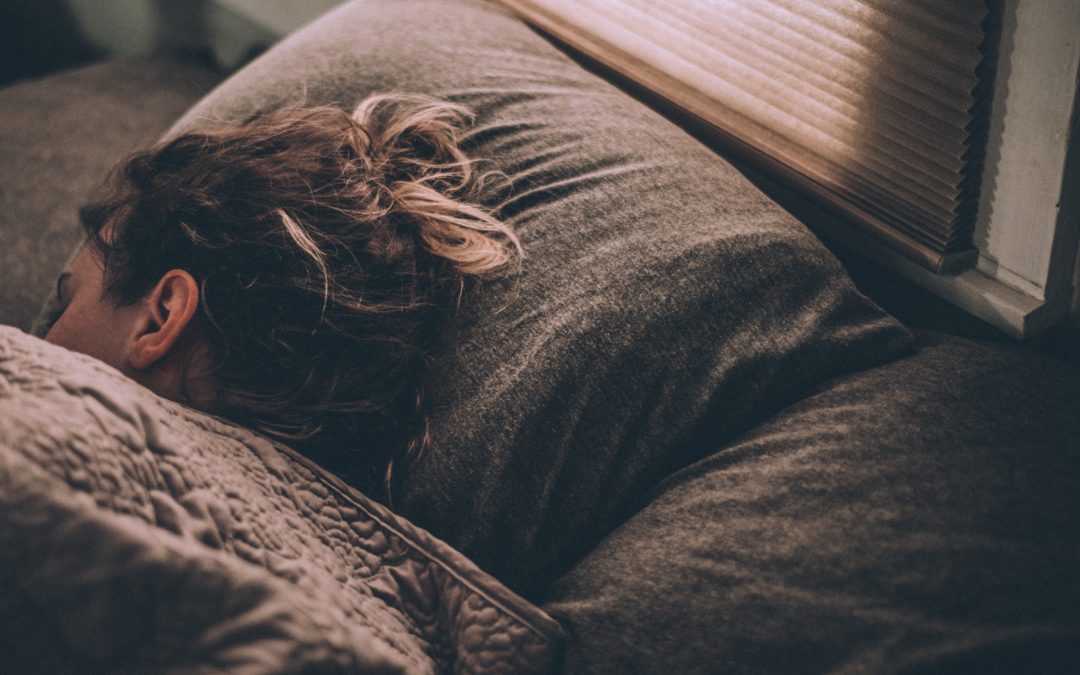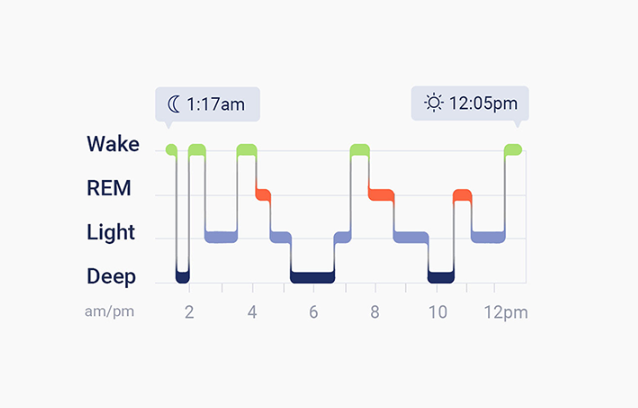
by Baginda Tirtadji | Monday, October 21, 2019 | Research, Sleep
Your sleeping position will have a serious result on your sleep in addition to your health. Poor sleeping position may cause back and neck pain, fatigue, muscle cramping, impaired circulation, heartburn, headaches, abdomen troubles, sleep disorder, and even early wrinkles. If you follow all the foundations — leave your phone out of the chamber, do breathing exercises, move to bed at a not too late hour, have a comfortable bed environment, get eight hours of sleep, and even taking your Somnox Sleep Robot to bed — you’ll still run the chance of feeling ill-tempered and aching when waking up. The one factor you could improve on is your sleeping position [1].
We’ll discuss several health advantages and some disadvantages of the three most common sleeping positions!

Side Sleeping – The Best
Health advantages of side/fetal sleeping:
Side sleeping is unquestionably the most ordinarily reported sleep position [2]; it is able to have plenty of health advantages. If you snore or have a hassle in regulating your breathing, sleeping on your right side is the most suitable choice for opening up your airways, therefore, you’ll be able to breathe better at nighttime.
In addition, it may be good for your spine and would possibly help relieve low back pain. This position is exceptional for pregnant women who often experience trouble sleeping at night due to discomfort and pain in their back and spine. Carrying around extra weight when a woman is pregnant put more strain on the back and can lead to back problems all throughout pregnancy.
Pregnant women ought to consider sleeping on their left side as a result of the baby pushing their organs upward, there is abundant room in there. throughout maternity, the heart is already operating quicker to support the baby, and sleeping on the correct side, together with the additional pressure from the organs, may delay the flow of blood to the mother’s heart and also the baby’s too.
Slumbering on your side will facilitate your spine to induce a break from the pressure from holding your head up, sitting or standing throughout the day.
Curling abreast of the left or right may even be smart for your brain. A study found that sleeping on your side would possibly lower the threat of developing brain disease, Alzheimer’s disease, and alternative neurologic ailments. According to the study, sleeping on your side is ideal for clearing the glymphatic pathway to the brain that is responsible for removing waste and other harmful chemicals that travel to the brain. Similar to your body’s entire lymphatic system, the ability to wash out these chemicals leave you with a better functioning brain. When your brain is healthier and stronger, you are much less likely to develop brain-related illnesses as you get older.
Likewise, sleeping on your left side may assist the flow of blood to your heart. Blood gets circulated then streams back to your heart on the correct side, once your heart pumps blood to your body. If you sleep on your right facet, the heaviness of your body smashes up opposite to the blood vessels that come to your ticker.
Do you struggle with acid reflux, or know of anyone who struggles with it? Acid reflux is a condition where the acid in one’s stomach goes up into the esophagus and doesn’t stay where it belongs. It’s that feeling when you eat and then you feel you’re throwing up in your mouth, your throat may burn and for some, the stomach feels totally out of sorts. It’s a pain in the stomach that one can’t describe, and many times heartburn can accompany the other symptoms as well.
The doctors will more than likely suggest that you sleep on your left side and not on your right side. Several studies have proven that sleeping on your right side tends to aggravate the reflux. Versus sleeping on the left side resulted in the calming of the reflux.
However, if you do sleep on your right side it’s best to prop your upper body up. There are body wedges you can invest in and doctors can refer you to the proper stores to purchase them.
Lying on the back is said to be the worse position for one who suffers from acid reflux. With that being said if you sleep on any side let it be the left if you can help it, and if not the left then propped up on the right side. Stay off your back as much as you can.
Lying on the back causes the fluids in the stomach to flow where they please, and the body being to the side keeps them in one fixed position. On the other hand, being propped up keeps them down and doesn’t give them free range to enter back up into the esophagus. The propping up gives you all the more comfort regarding reflux at night.
Some Disadvantages
Sleeping on your side, you’ll typically come to life with a numb arm. That needles and pins feeling comes from the so-called “capillary crush,” once the burden you’re putting on your arm, or the other frozen part is putting extreme pressure on your blood vessels. There may be a lot of crushing pressure that you simply misplace blood flow.
Poor blood flow isn’t the sole downside to obtaining slumbering when lying on your side. Studies reveal that it will speed up pyrosis and acid reflux at nighttime. If you repeatedly suffer from stomach upset at nighttime, you need to opt for a different sleeping position [3].
Furthermore, for some people, sleeping on your side can lead to shoulder pain and discomfort. When you sleep on your side, your shoulder takes the brunt of the pressure from the rest of your body. That pressure is persistent for as long as you are sleeping on that side. If you are sleeping for hours per night on that shoulder, an aching shoulder or worse pain may develop. If you find that is the case, you will either want to switch back and forth from sleeping on your right side to your left side, or you will need to find a new sleeping position altogether.
The same goes for jaw pain. If you have jaw issues to begin with or jaw pain develops from sleeping on your side at night, it is due to the pressure you put on your face and jaw muscles while sleeping. You will want to opt for a different sleeping position if you find this is a recurring issue.

Back Sleeping: Reasonably Good
Health advantages of back sleeping:
Falling asleep on your back would possibly facilitate you waking up feeling more energized than usual. That’s as a result of resting on your back is the best position for obtaining prime quality sleep. It’s the sole pose where you’ll be able to sleep all through the night while not having to alter. After you sleep on your back, your load is equally distributed across your body structure, very different to alternative positions.
In addition, if you’ve got lower back pain, resting on your back along with your knees supported by pillows may take some stress off your spine and ease the pain. The rounding error in your lower back mimics the natural curve of your spine that happens after you are sleeping on your side, within the fetal sleeping position. Consider it this way: after you are lying on your back along with your legs extended on the ground, you’ll be able to presumably suit your hand within the area between your lower back and also the floor. However, once your knees are up and your foot positioned flat on the ground, you will decrease some tension from the lower back throughout the night.
Some Disadvantages
While back sleeping is the most favorable for several individuals, unfortunately, it’s not for everybody. After you are on your back, your higher airway is the least stable as a result; it’s possible you will snore a lot more or follow unhealthy symptoms of sleep disorder, conditions which will be irritating to bed partners and furthermore additionally harmful to your health.
Do you or anyone you know suffer from sleep apnea? Sleep apnea is when one’s breathing starts and stops repeatedly. For many, it’s a very serious condition, while some don’t deal with it as severely. Sleep apnea is one of those sleep disorders that are affected when sleeping on the back. It can certainly make symptoms worse, snoring louder and you run a higher chance of possibly even choking on dry air that you may breathe in.
When we rest at night it’s the time for our bodies to regroup and get situated for the next day. Without the proper rest and appropriate sleep patterns and sleeping positions, you don’t give your body what it needs. Be sure you are taking the necessary precautions if you or anyone you know is struggling with a sleep disorder such as sleep apnea.
Making sure there is less tension on your lower back when you are sleeping on your back is key to making this sleeping position work. Many people will find that if they sleep on their back too long at night they will wake up in the morning with an aching lower back. If your legs are not supported and slightly raised to make your lower back press into the mattress, that curvature in your spine puts unwanted tension in the lumbar region. Eliminating the hallow in the lower back will ensure you will wake up feeling refreshed and pain-free.
The spine is very important to pay attention to when sleeping. The most natural position for the spine is when you sleep on your back. Proper alignment is also key regarding healthy sleep positions. That lower back pain you may be experiencing could very well be due to improper sleep positions. A quick trip to a chiropractor for many would solve the back problems they are experiencing. Many would begin to realize that a suitable mattress that fits your body, your level of necessary rest and the way you sleep, is very important to the health of your back.

Stomach Sleeping – Less Recommended
Some Advantages:
If you’re a back sleeper who will snore and you cannot differentiate sleeping on your side, lying on your belly can be a decent way of opening your airways a small amount. When your airways are opened more it is easier for air to flow in and out of your lungs, reducing the amount of snoring throughout the night. Sleeping on your stomach to reduce snoring does not work for everyone though. However there are not too many alternative advantages.
More Disadvantages:
Sleeping on your belly may lead up to pain within the neck. This is the foremost awful position as a result of moving your neck to nearly an entire 90-degree angle from your body. This sleeping position may lead to varying degrees of neck pain. Additionally, it’s not healthy for your back.
Thus it can be concluded that side sleeping and back sleeping are the most effective sleep positions which you’ll be able to switch in line with your comfort. However, try to avoid sleeping on your back because it could end up in unwanted effects like creating pain in your back, lumbar region, and your neck.
While pregnant some doctors tend to recommend not sleeping on the stomach after you reach a certain point in the pregnancy. I say some because some doctors also say that it’s ok to sleep on your stomach as long as it’s comfortable for you and your growing stomach.
Pregnancy pillows and body pillows do the pregnant body good while sleeping. There are also pillows that one can lay on with the growing belly settling on top with an opening. Therefore putting no pressure on the stomach in any overbearing way.
Overall pregnant moms have many options as to how they want to sleep and what may work best for them, and whatever complications one may or may not have during pregnancy. If you do choose to sleep on your stomach well after your stomach is protruding while pregnant, play it safe and consider buying a pillow specifically designed to keep you and baby safe, secure and comfortable while sleeping.
Why is a good night’s sleep so important?
A good night’s sleep is important because the day after you either get good rest or don’t is going to flow based off of everything that happens during the night. Whether or not you reach that REM sleep all depends on how good you’re resting. Your body has to shut down throughout the night enough for you to be relaxed and comfortable enough to get to that deep level of sleep.
Deep sleep enables one to many times dream is what some studies say, and of course the more hours of rest you get the greater chance you have of reaching that level of rest. Your mental state depends on the level of rest your body engages in throughout the night. The way you operate on the job depends on it and if you have children then you know that your level of rest affects just how well you do at parenting also.
Try out different positions to see what works best for you and don’t be afraid to change it up if you simply get tired of sleeping a particular way. Just be sure that you pay attention to the heightening of any sleep disorders, reflux or anything else that would be effected through the night. You want to be comfortable but not at the expense of worsening some other condition that you may or may not have.
So How Do You Sleep With A Sleep Robot?
The Sleep Robot is designed to be used while laying in a side sleep position. The sleep companion is molded in such a way that it follows your natural fetal pose. However, it is certainly possible to cuddle with the Sleep Robot if you’re either sleeping on your back or sleeping on your belly. The trick is to hold the sleep companion in such a way that you physically feel the breathing rhythm. By doing this, you can still be guided to the breathing rhythm of the Sleep Robot and thus fall asleep easier.
This article was co-authored and fact-checked by Dr. Brent Wells

Dr. Brent Wells, D.C. is the author of over 700 online articles that have been featured on sites such as Dr. Axe, Lifehack, and many other health publications. These articles include various types of information about how you can live a healthy and happy life. Dr. Wells is a chiropractor in Alaska where he has treated over 7,000 patients. He created the Alaska Back Pain Protocol, which has helped thousands say goodbye to back pain.
This one took a while to write. If you liked it, joining the email list is really appreciated. Thank you in advance!
References:
- https://www.sleep.org/articles/best-sleep-position/
- https://www.onhealth.com/content/1/best_sleeping_positions_sleep
- https://bettersleep.org/better-sleep/sleep-positions/

by Baginda Tirtadji | Thursday, October 17, 2019 | Sleep
The ability to meet and beat life’s daily challenges may be linked to the bedroom. Over two-thirds or 69 percent of Brits feel sleep-deprived and lethargic during the day, and diet may be the culprit. When and what you eat before bed play major roles in the success of an energizing slumber and even something as simple as a glass of water to help muscles and joints relax can promote a great night’s sleep.
Patterns To Produce Good Sleep
Sleep is all about routine and forming regular eating patterns with dinners rich in proper minerals that aids proper slumber. It’s a good idea to eat dinner four hours before going to sleep, most sleep experts claim. In planning a mindful supper, there are five main vitamin and mineral groups essential for producing a healthy, deep sleep that include tryptophan, magnesium, calcium, vitamin B6 and melatonin.
The Deep Slumber Menu
The perfect sleep-inducing supper would include salmon or a lean chicken breast as the main course (vitamin B6), with sides of leafy greens (melatonin) and brown rice (magnesium) covered in lentils or beans (tryptophan), and all washed down with a cold glass of milk (calcium). After dinner, there are some sleep-inducing snacks that can stop blood sugar levels from dropping overnight, which can wake you up and aid restlessness. Bananas and almonds are rich in magnesium and melatonin which relax muscles and encourage sleep. A melatonin-rich small bowl of oats with a dash of honey can also help you wind down quickly.
The Effect Of Germs On The Sandman
Bacteria buildup in the belly can also be a negative nocturnal factor as a healthy gut promotes good sleep according to Tim Spector, professor of genetic epidemiology at King’s College London and author of “The Diet Myth”. Taking probiotics (a type of live bacteria) and prebiotics (mainly fibre) feeds the good bacteria in our guts and has a significant effect on the quality of deep REM sleep. Conversely, processed foods, excess sugars, lack of fibre and inadequate hydration contain unwanted germs that create bad bacteria internally and result in a variety of adverse health conditions, including sleep disorders.
Dietary choices can weigh the heaviest on whether you have a good or bad night’s sleep. Being mindful of the minerals consumed at supper time whilst providing several hours of natural digestion before tucking in can make or break healthy sleep cycles. Eating right not only improves nocturnal patterns, but feeds the body and brain with more energy and focus to attack the next day’s challenges with energetic vigor.
Want to become more restful?

by Baginda Tirtadji | Wednesday, October 16, 2019 | Sleep
Good night sleep is important for your health. And sleep deprivation or insomnia has become a serious matter. There are a lot of guides about balanced diet, fitness and exercise, but not so much info about how to improve your sleep.
Sleep deprivation and insomnia links to many conditions, some medical and others are psychological. However, the good news is that these conditions can be reversed according to experts.
You are always welcome to check out the Somnox Sleep Robot, which will help you to sleep faster and longer.
So, here are the reasons why you can’t sleep and the best recommendations on how to stop them from depriving you.
1. Too Much Caffeine
It is one of the obvious reasons. I’ve seen a lot of “coffee maniacs” who easily enjoy 6-8 cups of strong coffee per day. Of course, it may be the cause for your sleep deprivation. Most of the people tend to drink coffee late in the day, but keep in mind that the average half-life of caffeine is 5 hours.
So, if you take it late in the day you will still have some dose of caffeine in your system. Drinking coffee late in the day is a bad idea. If you are into coffee, do it early. In fact, too much caffeine not only interferes with your sleep but also leaves you feeling tired. You need to limit your intake of it to ensure that you do not experience a difficult time trying to sleep.
2. Smoking before bedtime
Many smokers equate smoking to relaxing, but as we all know there are so many reasons to quit. Sleep deprivation is actually one of those reasons. Nicotine is a stimulant, therefore, when you smoke before bedtime, you can expect to have inadequate sleep and waking several times throughout the night. This is similar to drinking coffee just before sleep. The best remedy to this is very obvious – just quit smoking.
3. Too Warm Room Temperature
When you sleep, your body and brain want to cool down. However, if your room temperature is too warm, it will interfere with the cool down process of your organism.
Trying to catch some sleep at night when it is too warm is troublesome. Try to keep your room cool, open window, turn on a fan or something like that.
4. Circadian Rhythm Disorders
Did you know that your body may desire to sleep at the wrong time? It can be a symptom of a circadian rhythm disorder, and that could be the reason why you can sleep.
Circadian rhythm means the natural pattern of the body’s function which includes the urge for hunger and sleep. Most of us want to sleep overnight, but there are people who may experience a shift in their circadian rhythm. The rhythm could shift early (sleep phase syndrome) or late (delayed sleep phase syndrome).
If you happen to have delayed sleep phase syndrome, it might be difficult for you to fall asleep at an earlier time. Therefore, you will likely stay in bed awake for several hours at the beginning of the night. After this you sleep late in the night, which makes it difficult for you to wake up in the morning. There are several treatments for this condition including melatonin, phototherapy also known as a light box and behavioral therapy.
5. Going to Bed Hungry
Going to bed hungry can be the reason why you can’t sleep. Hunger pangs will not let you get a good night’s sleep; you will keep on waking up. There has been evidence that suggests that people who try to lose weight may wake up several times in the night. Don’t ever go to bed hungry. You should eat food that will give you greater satiety. A meal that has more protein can help you have greater satiety than that with more carbohydrates and fat.
6. Hormonal Changes
For women, hormonal changes happen throughout their reproductive cycles. Women are more likely to experience poor sleep around menstruation which relates to pain and mood changes.
Pregnancy also can lead to sleep deprivation. This is due to an increase in the hormone progesterone which gets you waking up to get to the bathroom, especially in your first three months in your pregnancy. Also, when you’re in your last trimester, your belly may cause some discomfort during your sleep.
7. Having a Room That isn’t Dark Enough
We fall asleep overnight partly because of the darkness. You should not sleep when the lights are on. When your eyes expose to lights during the night, your brain gets tricked into thinking that it is time to wake up. This leads to a reduction in the production of melatonin, a hormone that releases by the lineal gland. Melatonin induces sleep and lowers your body temperature, therefore, when its production decreases at night you lack sleep. Don’t try to sleep with lights on – it can be a bad habit.
8. Addiction to Apps
Today, there are so many addictive apps, they can actually tie us to them all day long and even at night. We tend to keep on checking our emails, Twitter, Instagram, Facebook, etc. Especially for teens, it is becoming a massive issue. Seems, you just can’t fall asleep without checking up an Instagram feed for the tenth time. All that can deprive your quality sleep. Remember when using your gadgets at night, your eyes exposes to lights which triggers the brain to induce a reduction in production of melatonin, thus you lack sleep. If you want a good night’s sleep, it is better to keep your laptops, mobile phones, iPads out of the bedroom.
9. Doing too Much Before Bed
Most of us do a lot of household chores, finish some work-related project or are on the internet just the hour before bed. This can actually make it difficult for you to catch some sleep. Working right up until bedtime does not allow you to relax and prepare your body for sleep. Just an hour before, you need to settle down and change the mode to a person who wants to have a good night sleep. You can take a bath, read a book or simply do anything that will make you feel relaxed.
10. You’re on Medication
There are certain medications that can affect your ability to catch a good night sleep. Some over-the-counter drugs, especially painkillers contain caffeine which can affect your night sleep. When buying such drugs you need to make sure to read the ingredients on the box or consult with your doctor. Certain medications for medical conditions such as high blood pressure and asthma can also affect your ability to fall asleep and stay asleep. There are certain antidepressants, especially SSRIs such as Lexapro, Paxil and Prozac which continually release serotonin and can keep you alert. It is important to talk to your doctor if you think that your medications are taking a toll on your sleep.
11. Late Workout
Regular exercises, fitness and gym obviously can improve your sleep and overall health a lot. However, exercising too late about three hours to bedtime might disturb your sleep. Exercise keeps your brain alert which means that it will be difficult for you to catch some quality sleep. If you’re one of those people who like to exercise in the evening, do it at least four hours before bedtime.
12. Having too Heavy Dinner or Eating too Late
Having too heavy dinner or spicy foods three hours before bedtime can be the reason why you can’t sleep. Late food can stimulate the body keeping the brain awake making it difficult for you to fall asleep. Try to have dinner at least three hours before bedtime. We recommend not to eat a lot after 6 pm. Also, try to avoid spicy foods for dinner. If you happen to feel hungry closer to bedtime, have a small snack that consists of protein and carbohydrates such as an egg with a cracker.
13. Trying to Solve a Problem in the Middle of the Night
Sometimes you might go to bed thinking about a problem you need to solve. Maybe, it is some stressful project, you encountered on your job. We tend to wake up at times during the night, and then the problem just pops into our heads. To avoid this, you need to leave your bedroom and get to another room, just to redirect your thoughts to something else less stressful in another environment. When you feel less stressed, get back to your room and be sure to catch some good sleep. You should never try to think deep through a problem in the middle of the night. Just let your thoughts to go away, don’t “debate with thoughts”.
14. Drinking Alcohol Too Late
Many people think that alcohol can induce sleep, but alcohol actually disrupts it. After you drink alcohol, you might feel sleepy, but that only lasts for a short while. Taking alcohol close to bedtime causes your sleep to be lighter and waking up several times throughout the night.
15. You Sleep In
On Friday and Saturday nights, we tend to stay up late and sleep in on Saturday and Sunday mornings. This is what many people do after a hard week at work. Staying up late and then sleeping in can ruin your biological clocks. Our biological clocks are controlled by a cluster of nerve cells in the brain that also regulate appetite and body temperature. So, even if you try to get to bed early on Sunday night it becomes difficult for you to catch some sleep, and you will feel tired on Monday morning. To avoid this make sure you don’t sleep more than an hour longer than usual even after you’ve been staying up late.
16. You Have a Messy Bedroom
Having a messy bedroom can affect your sleep too. Having a cluttered nightstand, desk or floor leads to a bad sleep environment. With a cluttered mind, you can’t sleep well. Your room should be very well-organized and free of excess items.
17. Clockwatching
Clockwatching, though hard to avoid, can disrupt your sleep. The habitual clockwatching can disorient your circadian rhythms, and within a short period of time, you will find yourself waking up at a time you don’t want to every night. This will deprive you off enough sleep. So, always place your watch in a direction that’s not facing you.
18. Staying Up to Watch TV Until You’re Sleepy
Watching TV until late in the night is always a bad idea. TV emits light that stimulates your brain activity something that you don’t want to happen if you want to have a good sleep. Also, the TV light tricks your brain into waking up.
Back to you
This is just an overview of possible reasons why you can’t sleep. Of course, you should discuss these problems with your general practitioner first, to get to the root cause of the problem. Any other suggestions or reasons we missed? Join the discussion below.
The Somnox Sleep Robot helps people with stress and anxiety related sleep problems to sleep faster. It does so by simulating breathing, and give you the rest you need. By simulating a human breathing rhythm that you can feel and synchronize with, it helps you to slow down your breathing and become relaxed. It feels like a small breathing companion that helps you to wake up with more energy and get more out of your day.
Want to become more restful?

by Baginda Tirtadji | Wednesday, September 25, 2019 | Sleep
Having a good quality night’s sleep has become a privilege to a lot of people nowadays. More and more of us are becoming occupied with our jobs, forgetting that our health is in the first place.
To stay healthy, we need a couple of things, such as a good quality sleep every night, proper nutrition, and moderate exercise. In this new and modern world, people are taking sleep for granted. We’re here to show you why sleep is important and why we shouldn’t neglect it.
Having sleep disorders has become more common than ever. Did you know that more than 1.2 billion people worldwide have a variety of sleep issues? Only in the US, between 50 and 70 million people suffer from a chronic sleep disorder. The most common sleeping issues are sleep apnea, insomnia, narcolepsy, and sleep issues related to snoring and bruxism.
How Technology Affects Sleep?
ALAN (Artificial Light At Night Effects) means that you’re using cell phones, tablets, laptops, or other tech devices right before going to bed. The blue light from the screens affects the level of melatonin, which is in charge of our body clock. For this reason, we can’t get a good, continuous night sleep.
ALAN also has negative impacts on:
- sleep disorders
- negative emotions
- morning attention abilities
- body thermoregulation
- circadian clock.
However, not all tech devices are bad for our sleep. Some of the newest tech innovations were created to help overcome sleep issues. Somnox created a Sleep Robot that helps you relax by simulating breathing to improve your sleep.
The Right Amount of Sleep
A 2018 study shows that the ideal length of night sleep is between six and eight hours. Many people don’t get the recommended hours because our lives are just too busy. However, sleeping less, or even more than the ideal length for your age and sex can even lead to obesity, diabetes, inflammation, and cardiovascular disease.
Here are some tips and tricks on how to be continuous with your sleep:
- turn off screens at least an hour before going to bed, and try to avoid sleeping in the same room with tech devices
- make a schedule with your plans during the day and try to stick to it
- avoid heavy and spicy food at least 2-3 hours before going to bed
- avoid caffeine after 3 pm
- limit alcohol and cut out cigarettes
- drink enough water
Myths About Sleep
- Snoring isn’t harmful. Snoring can actually be very harmful. It can be a sign of sleep apnea that is associated with other medical problems.
- Daytime sleepiness. Daytime sleepiness can be a sign of an underlying medical condition or a sleep disorder, such as narcolepsy and sleep apnea.
- Don’t wake up a sleepwalker. Waking up a sleepwalker isn’t dangerous or harmful, but you can make them nervous or angry.
Bottom Line
Sleep is very important, and we should learn to take good care of it. If you want to become an expert and learn more about sleep, check out the infographic below.
This post was written by Dr. Nikola Djordjevic, M.D.












Recent Comments